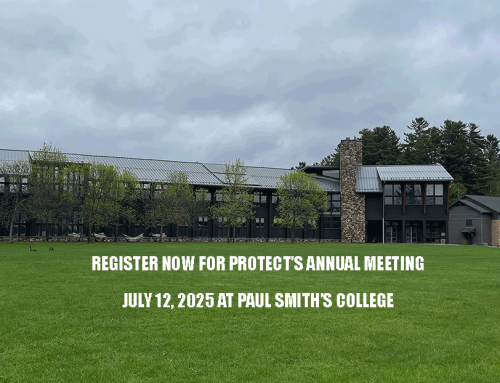For more than a decade the Adirondack Park Agency has failed to administer and uphold a basic part of its law, marking a sharp departure from its history.
The Adirondack Park Agency (APA) was created by the Adirondack Park Agency Act (APA Act), which also established the Adirondack Park Land Use and Development Plan (Development Plan) and gave the APA the responsibility for administering and enforcing the Development Plan. The APA implements its statutory responsibilities through its regulations and a series of policies. These regulations and policies establish the standards for how the APA implements the APA Act and reviews development projects in the Adirondack Park.
One part of the APA Act that has seen major changes in recent years is the strange and mysterious case of the disappearing formal adjudicatory public hearing as administered by the agency. There have been no changes the APA law, regulations, or policies, but the APA has made major changes to how it implements this part of its law, nevertheless.
From the inception of the APA in 1973 through 2010, the APA held 150 adjudicatory public hearings on proposed development projects, a rate on average of just over 3 per year. This data was obtained from a Freedom of Information Law request to the APA. In contrast, from 2011 to the present, there have been no such hearings. For its first 37 years, the APA, through Democratic and Republican Governors, and through a series of different APA Chairs appointed by different Governors, upheld the APA Act and regularly ordered projects to go through the adjudicatory public hearing process. Since 2010, there have been none, though there have been calls for these hearings where a number of controversial projects have merited them.
Public hearings are a required and essential part of the APA Act. The Act refers to “public hearings” more than 50 times. The Act only refers to “Resource Management” 20 times, “Hamlet” 26 times, and “undue adverse impact,” which is the central required finding in an APA permit, only seven times. Formal public hearings are referenced in eight sections of the APA Act (Sections 804, 805, 806, 807, 808, 809, 812, 814) and Section 812 “Public Hearings” is solely devoted to their administration. Clearly, the framers of the APA Act recognized their importance and envisioned their routine use.
Adjudicatory hearings are quasi-judicial proceedings and provide information from witnesses under oath, which means that they are required to tell the truth. Also, all information in a public hearing is subject to cross-examination so that the reliability of verbal testimony and written information can be scrutinized. Information in a standard project review is not provided to the APA under oath, and there’s no cross-examination. Adjudicatory hearings are administered by an Administrative Law Judge from outside the APA who upholds standard rules of evidence. There are no rules of evidence in an APA project review and there is no impartial arbiter from outside the APA to oversee a standard project review.
An adjudicatory hearing is also an opportunity for the public to get involved, if they are approved as an official “party” by the Administrative Law Judge after making a factual application. As a party, they can provide independent expert testimony and information and can cross-examine the testimony provided by the applicant, APA, or other parties. There’s no such role for the public in a standard review of a permit application. The purpose of an adjudicatory hearing is principally to develop a factual record based on the evidence submitted during the hearing, where all participating parties can make their case, so that the APA Board can then use that evidence to make a sound decision. In a standard APA application, there is no factual record that has been publicly scrutinized and verified. These are just a few of the enormous differences between a standard review of an application at the APA and an adjudicatory public hearing.
The statute governing APA’s decision about whether to conduct a standard review or to hold an adjudicatory public hearing states:
The determination of whether or not to hold a public hearing on an application shall be based on whether the agency’s evaluation or comments of the review board, local officials or the public on a project raise substantive and significant issues relating to any findings or determinations the agency is required to make pursuant to this section, including the reasonable likelihood that the project will be disapproved or can be approved only with major modifications because the project as proposed may not meet statutory or regulatory criteria or standards. The agency shall also consider the general level of public interest in a project. No project may be disapproved without a public hearing first being held thereon. (APA Act Section 809(3)(d))
Under the APA Rules & Regulations Section 580.2 “Determination to conduct public hearing” eight criteria are listed for the APA to use to make its decision about whether a proposed project merits an official adjudicatory public hearing. A project is appropriate for a public hearing if just one of the following eight criteria is applicable:
- The size and/or complexity of the project, whether measured by cost, area, effect upon municipalities, or uniqueness of resources likely to be affected.
- The degree of public interest in the project, as evidenced by communication from the general public, governmental officials or private organizations.
- The presence of significant issues relating to the criteria for approval of the project.
- The possibility that the project can only be approved if major modifications are made or substantial conditions are imposed.
- The possibility that information presented at a public hearing would be of assistance to the agency in its review.
- The extent of public involvement achieved by other means.
- Whether an environmental impact statement will be prepared pursuant to the State Environmental Quality Review Act.
- The statutory finding required by section 814(2) of the Adirondack Park Agency Act in the case of State agency projects reviewed thereunder.
It stands to reason that the need for formal adjudicatory public hearings has remained the same as it did previously because the types of projects that come before the APA have been largely consistent through the decades. What has changed is that the APA senior staff and the Board have simply made the unwritten decision that formal adjudicatory hearings are no longer options for the Board and for all practical purposes will not be considered.
In the last decade, APA senior staff and the Board have invented their own new process by which to evaluate whether a public hearing is necessary for a project. In deliberations for a project in the western Adirondacks, the APA Counsel and staff said a public hearing was only necessary if there were “unclear facts.” There is no such standard listed in the official criteria in the APA Rules & Regulations cited above or in the APA Act and that interpretation of the regulations reduces the eight criteria above to a single erroneous standard.
In a presentation to the APA Board in December 2021 on “the APA Act 101”, a senior attorney on the APA staff outlined the new public hearing criteria used by the staff, starting with a slide from APA Act Section 809, as cited above. The attorney then outlined how the staff now interprets the APA Act and the Rules & Regulations, stating: “Hearings have to be held … in two situations. When there’s unclear facts prohibiting the agency from determining whether a project is approvable, we have to hold a hearing to figure out those facts because we don’t know something’s missing in the facts. We also have to hold a hearing before an application can be denied.” This explanation from the attorney is a factually incorrect reduction of the eight criteria listed above.
The attorney then went on to state: “There’s a whole bunch of additional factors, this is sort of an extrapolation of some of the stuff that was touched on in that statutory language, that I just read. I’m not going to read through all of these, but these are the additional factors that can be considered in determining whether to hold the public hearing.”
Here, the attorney talked over a new slide “Permitting Process – Adjudicatory Hearings” (see below). The attorney outlined more specifically the way that the APA now handles the question of whether the send a project to a public hearing. Their criteria, as stated in the slide, is that a hearing must be held if there are “Unclear facts” that “prohibit the Agency from determining whether a project is approvable” and that a hearing must be held “before an application can be denied.” Listed as “Additional Factors” are the eight criteria above from the Rules & Regulations. This is also wrong. The “Additional Factors” are not “additional,” they are the factors, the only factors, to be considered under the law.
The APA staff could not have said it any plainer. The APA had introduced a new standard that is not in the APA Act and not in the Rules & Regulations, but is a new standard that is entirely incorrect and subjective and for which the APA cannot be held accountable.
The attorney then described how the staff applies this unofficial and subjective new criteria:
We don’t deem an application is complete now when we believe necessary factual information is missing from an application…. If we, if staff feel either that an application contains unclear conflicting, whatever it is, facts that we as staff feel would prohibit either staff through delegation or the Agency from determining whether the project is approvable or staff feel that they may, would, be thinking of recommending denial in a presentation to the Board, in either one of these situations, if this is what we’re seeing, we tell the applicant, that we’re as honest as possible, we tell them why and then we explain what’s going to happen. We don’t know what’s going to happen because … the staff presentation to the Board is probably a month or two away. But if we’re seeing the writing on the wall, that we are going to recommend to the Board a vote to send the project to hearing, either because we think we’re missing facts we need, or because we think that the project just simply isn’t approvable, we tell the applicant that. And we explain the hearing process and we explain that the Board may or may not decide, agree, with that…. But if the project does then go to hearing, that’s such a massive investment of time and money that every time this has happened in all these past ten years, or whatever it is, the applicant has chosen to either submit the information that we have said is missing. Or they change their proposal if it’s something we thought we were going to recommend denial on….Or simply withdraw the proposal overall. One of those three outcomes has happened every time we’ve run into one of these situations in the past 10 or so years.
These statements by the APA attorney are hard to take seriously because the APA’s threat to send a project to public hearing is an empty threat because they’ve stopped sending projects to public hearing. In fact, controversial projects have been changed very little in recent years from their initial application to a final permit as applicants dig in and wear down the staff. A project that starts as a ring of houses around an undeveloped pond ends as a ring of houses around an undeveloped pond. In the first 37 years of the APA Act, APA staff also threatened applicants with a public hearing, which is a longstanding administrative tactic, but the difference is that they also sent projects to public hearing, making the threat real.
In a question to this APA attorney during the December 2021 presentation on the APA Act 101, an APA Board Member struggled to put this new process into his own words so as to sharpen his own understanding for when an adjudicatory hearing would be appropriate.
Question: I just want you, if you would end it on, one more time, the reasons for going to, voting for an adjudicatory hearing, are basically, as I understand it, that, as I’m asking for you to put it in your own words, that we don’t have, we don’t feel we have, enough information? Because the adjudicatory hearing, you would think from the sound of it, that somebody’s going to judge something and make a decision? That’s not true. All they’re doing is providing a public process for unearthing more or different information and the same decision comes back to this Board again for a vote. There is no decision at that meeting, it’s just a collection of information. So, it’s really about information is it not? That’s really the reason you go to this kind of extraordinary hearing?
Answer: I think so, yeah, I mean the two times we know we have to go to hearing is when we need more facts, we need more facts, for sure, so that is absolutely about information. The other time is a little fuzzier because it’s before an application can be denied. So, we might kind of feel like we have all the facts we need, but we still need to do the process before we can deny the project. But you know other than that, which is just, you know, I would call it a semi extraordinary experience, simply because it’s been so many years since we’ve gotten to that point since we haven’t been able to work with an applicant on their project.
Again, this exchange is hard to take seriously, and reveals, in a half dozen ways, a deep confusion among the APA Board about the factors that need to be considered in determining whether to send a proposed project to an adjudicatory hearing.
It’s possible that a project before the APA can have really clear facts, but is not allowable under the law and the APA needs to deny it. To deny a project, the APA Act requires an adjudicatory hearing be held as a means of due process for the applicant. In this way, the APA does not have the same basic authority to summarily approve or deny a project like every Planning Board and Zoning Board of Appeals in New York State. Therefore, by choosing never to hold a public hearing, this means that the APA will never deny a project.
This exchange also shows that for the current APA, contemplation of sending a project to public hearing is now something “extraordinary” not something routine. As stated above, adjudicatory hearings used to be routine for the first 37 years of APA history, when 150 projects were sent to public hearing. These were regular occurrences, some years saw several hearings held. Now they’ve become something extraordinary. There may have been a loss of institutional knowledge at the APA over the last decade about how to actually implement an adjudicatory hearing process. However, the DEC uses this process regularly, and its Administrative Law Judges were regularly used by APA, so the process can be revived by leaning on DEC staff for assistance.
The APA has boiled down the decision to hold a public hearing to a subjective assessment about additional information where there are “unclear facts.” By putting on these regulatory blinders the APA openly dismisses the importance of all of the other considerations enumerated in the eight criteria above in its official Rules & Regulations. The APA Board and staff should be bound by the criteria in the Rules & Regulations and not make up their own ad hoc standard.
What rarely comes into the discussion is the role of the public in providing independent expert testimony or the broad, experience-informed concerns and perspectives from local residents and property owners about how a given project may impact their neighborhood or community. This is also a sharp departure from past practice. In one recent project, the APA received more than 3,000 public comments opposing a proposed mining project. Yet this outpouring of public concern was deemed insufficient, unworthy, and unimportant enough to warrant an adjudicatory hearing. In short, the APA Board and staff believe they know the issues in that community better than local property owners. At another point in the December 2021 presentation, the APA attorney said that “most opposition to a project is based on misinformation.” This shows a disturbing contempt for public input, and a failure on APA’s part to ensure that the public has all of the correct information available to it well in advance of any decision by the APA on a project.
The exchange showed that the Board is quite content with a made-up process where an unofficial, subjective standard now trumps APA law and regulations. In its various discussions dispensing with a public hearing, the APA Board and staff show a disturbing comfort with acting outside of the laws and regulations they swore to uphold and to instead act through ad hoc processes by which the APA is unaccountable.
The APA’s decision to suspend adjudicatory public hearings and change its application review process was not done through any kind of formal or legal assessment. There was no rule making process, no public review, no nothing.
We urge the APA Board to immediately undertake a course correction by first demanding that senior staff follow the law and the regulations, and second, by beginning once again to require that proposed projects go through the rigors of an adjudicatory hearing when the regulatory criteria has been met. The APA Board must not be content with the current state of affairs that has been put in place for the last decade. The public, including applicants, must also speak out against APA’s subjective and secretive practices.







